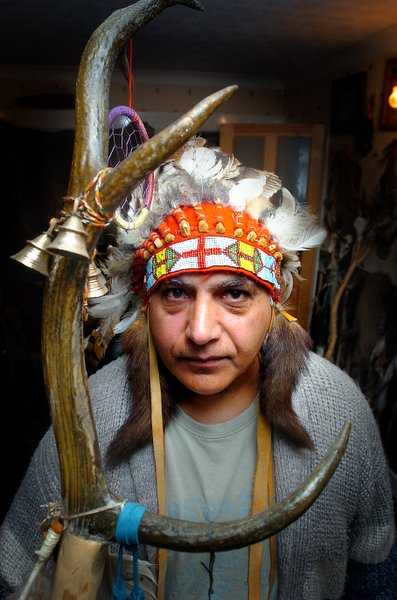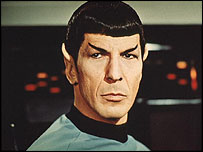Though there are no formal or definitive boundaries for membership, those who are likely to sample many diverse teachings and practices (from both 'mainstream' and 'fringe' traditions) and to formulate their own beliefs and practices based on their experiences can be considered as New Age. Rather than following the lead of an organised religion, "New Agers" typically construct their own spiritual journey based on material taken as needed from the mystical traditions of the worlds religions, also including shamanism, neopaganism and occultism.
New Age practices and beliefs may be characterized as a form of alternative spirituality or alternative religion.
In that regard, I'm like a Vulcan. I believe only in what you can prove with facts and evidence and logic. If there's no reason to believe in something, then I don't believe in it.
In contrast, both the religionist and atheist are sure of their beliefs, even though neither one has proof. They have faith that their position is the right one. Agnostics aren't like either type of believer because they have no definite beliefs.
New Agers have all sorts of religious and spiritual beliefs. But atheists, who are certain God doesn't exist, may have some beliefs aligned with New Ageism. For instance, they may believe the universe is filled with a "force" that isn't God but is supernatural. Or they may believe in the healing power of yoga or meditation or aromatherapy.
As an agnostic, I have no spiritual beliefs whatsoever. I'm the opposite of a New Ager, who tends to believe in anything and everything spiritual. No one in existence is less of a New Ager than I am.
All clear?



6 comments:
Ironically, your vague talk of "philosophical changes" and "new recombinants" is just the sort of thing that New Agers write. Once again, you've demonstrated you're a lot more of a New Ager than I am.
Judging by the obfuscating verbiage, you really don't know what "New Age" means. And even with the actual definition in front of you, you still didn't get it right. Wow.
If you're having trouble understanding what I wrote, please let us know. I'm not particularly interested in made-up definitions that have no basis in reality. If you want to discuss this subject, prove you can crack a dictionary or any reference source and give us a real definition.
Here's the definition of the adjective "agnostic":
http://dictionary.reference.com/browse/agnostic
ag·nos·tic /æg?n?st?k/
–adjective
3. of or pertaining to agnostics or agnosticism.
4. asserting the uncertainty of all claims to knowledge.
FYI, "asserting the uncertainty of all claims to knowledge" is the same as believing nothing without proof.
Whatever dictionary you're using, you might try one that was compiled since the 19th century. Agnosticism does not mean rejecting Christianity but not other religions. If it ever meant that, that was centuries ago. Its present meaning is equivalent to doubting established schools of thought.
If it isn't clear, "all claims to knowledge" means all religions, philosophies, and sciences. Of course, scientists are supposed to question scientific "truths," so a good scientist is agnostic by definition. But religionists are supposed to take their "truths" on faith, so agnosticism is contrary to every religion as well as atheism.
In short, I didn't miss anything, Russ. I've correctly defined "agnosticism" along with "decimate," "media," "semantics," and "New Age." You've yet to cite a definition for any of these terms other than the ones you've imagined.
Re "Examine writerfella's presentation of Vulcan principles": What, you mean the 10-20 lines of dialog you wrote in one half-hour cartoon? Is that supposed to impress us? I've seen every episode of the original Trek (TV shows, cartoons, and movies) multiple times. I've also read about 100 TOS novels as well as the standard reference guides.
So I doubt you know more about Vulcans than I do. But surprise me. Tell me a Roddenberry/Coon/Fontana-approved Vulcan principle that you know and I don't. Good luck with your answer.
"[T]he birth pangs of the next worldwide philosophy that will wrest and wreak havoc for humankind" sounds like more New Age talk to me.
"New Age" is a grab-bag of alternative religions that have been around for decades. It's not a change that's coming, it's a quasi-religion that's here now.
Unless a Star Trek story is published, it isn't part of the canon. Even then, it isn't really part of the canon unless it appears on an officially sanctioned ST show.
Moreover, writing stories doesn't give you more insight into the characters than reading them does. In addition to the material I listed before, I've read several dozen ST comics and graphic novels. What have you read that compares to that?
I'm glad your Lokili story isn't part of the canon. It sounds too gimmicky to me.
The Spock's World novel made the point that the Vulcans have humans to help them acknowledge their emotional side. Enterprise: The First Adventure presented a Vulcan who embraced emotions as a deviant. The canon doesn't need the Lokili also.
Incidentally, Vulcans don't reject emotions so much as suppress and control them. Only when they undertake the rigorous Kohlinar discipline do they actually try to purge their emotions. That's Vulcan Principles 101 for you.
Wikipedia defines nihilism as:
"Nihilism (From the Latin nihil, nothing) is a philosophical position which argues that the world, especially past and current human existence, is without objective meaning, purpose, comprehensible truth, or essential value. Nihilists generally assert some or all of the following: there is no reasonable proof of the existence of a higher ruler or creator, a 'true morality' is unknown, and secular ethics are impossible; therefore, life has no truth, and no action is known to be preferable to any other."
That doesn't describe me since I believe a true morality is knowable and secular ethics are more than possible. I gave you the definition of "agnosticism," which still has nothing to do with rejecting only Christianity. It's the correct word for my beliefs.
I've not read his thoughts on the subject, but I think it would be safe to bet (inside or outside of any Native-run or non-Native run gaming establishment) that Rob does not believe in astrology at all.
As for what is "canon" or not, Rob did say it is canon if "it appears on an officially sanctioned ST show". I tend agree that the aired shows of the Animated Series are canon, even if Paramount might (?) not. Thus, to me, Lt. Arex, Dawson WalkingBear, and the Kzinti Empire are all canon. Unpublished/unshown stuff I would not count as canon unless there is something really definite such as documentation that Gene Roddenberry specifically pointed at such an unrealized work and said "See this? This is what Star Trek is all about!!!"
There's no reason our erstwhile Writerfella should not be proud of "How Sharper Than a Serpent's Tooth". Here's a nice page I found concerning it:
http://www.geocities.com/Area51/3253/tas/21howsharperthanaserpents.html
Ah, for better use of preview. I used the wrong word, and did not mean "former".
Regardless of whatever else you are doing now, nobody is a "former" writer when they leave comments in blogs.
I didn't interpret "agnostic," since I got the definition from the dictionary. I suggest you do the same.
The book Jung and the New Age begins: "Jung's name has been widely associated with New Age spirituality for about three decades, but his relationship to this movement is problematical." Check it out on Amazon.com for more on your New Age beliefs:
http://www.amazon.com/Jung-New-Age-David-Tacey/dp/158391160X
Post a Comment